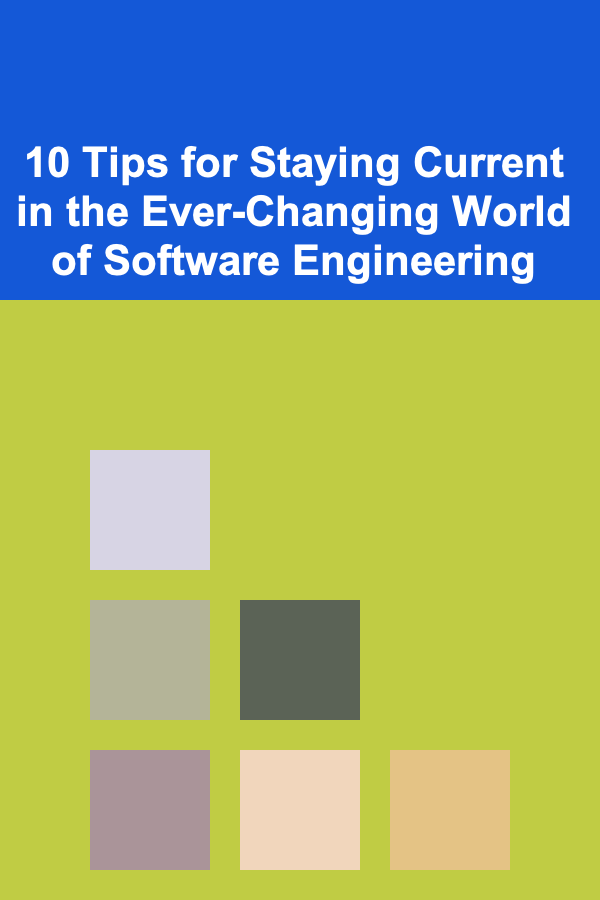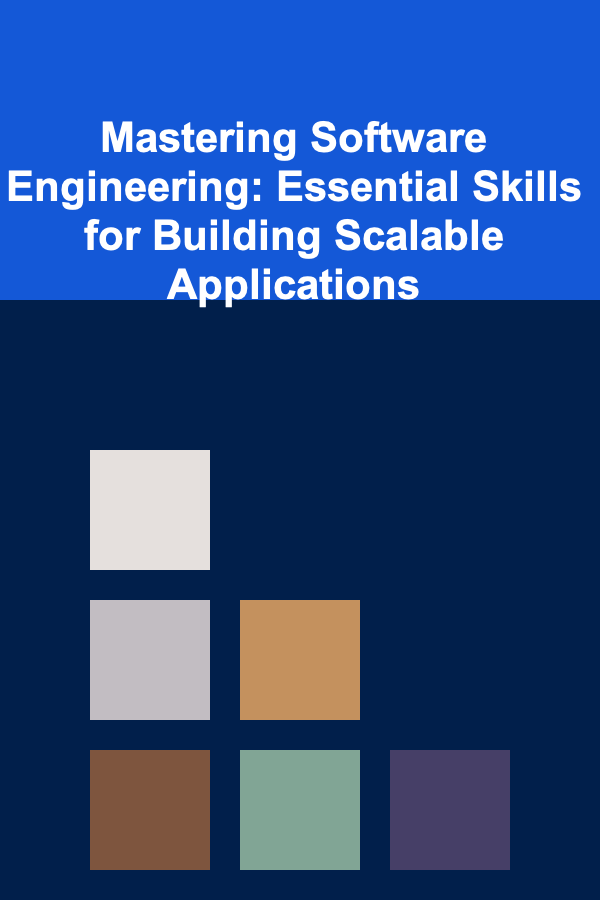
10 Tips for Staying Current in the Ever-Changing World of Software Engineering
ebook include PDF & Audio bundle (Micro Guide)
$12.99$5.99
Limited Time Offer! Order within the next:

Software engineering is one of the most dynamic and rapidly evolving fields in the modern world. As new technologies, methodologies, and frameworks emerge, software engineers must constantly adapt to remain relevant. The pressure to stay current can be overwhelming, but with the right strategies and mindset, it's possible to not only survive but thrive in this ever-changing industry.
In this article, we'll explore ten practical tips to help software engineers stay on top of the latest trends and technologies while continuing to build on their existing expertise.
Commit to Lifelong Learning
Software engineering is not a career that allows you to "settle in" once you've acquired a certain level of proficiency. The world of technology is evolving so rapidly that even the most advanced professionals must be committed to lifelong learning. New programming languages, frameworks, tools, and best practices emerge constantly, making it essential for engineers to dedicate time to learning throughout their careers.
How to Make It Work:
- Set learning goals: Whether it's mastering a new language, understanding a new framework, or becoming proficient in a specific tool, setting clear goals can help structure your learning efforts.
- Learn through practice: Building projects on your own or contributing to open-source projects helps reinforce new concepts and solidifies your understanding.
- Formal education options: Online courses, boot camps, and certifications provide structured learning paths to help you stay updated.
Follow Industry Leaders and Influencers
One of the most effective ways to stay up-to-date with industry trends is by following thought leaders and influencers. Many top software engineers and industry experts share valuable insights, tutorials, and advice through blogs, podcasts, social media, and video channels. By regularly engaging with this content, you can learn from the best and stay informed about what's coming next in the software world.
How to Make It Work:
- Twitter, LinkedIn, and GitHub: Many influential engineers actively post on social media, sharing their thoughts on emerging technologies or discussing ongoing trends.
- Engage with blogs: Platforms like Medium, Dev.to, and personal blogs are great for in-depth articles that explore new technologies and methodologies.
- Listen to podcasts and watch videos: Podcasts like "Software Engineering Daily" or "The Changelog," as well as YouTube channels dedicated to software engineering, offer valuable insights and tutorials.
Contribute to Open Source Projects
Contributing to open-source projects not only helps you sharpen your coding skills, but it also provides an opportunity to work with new tools and technologies that you might not encounter in your daily work. It's also a great way to collaborate with other engineers, learn from their code, and see how others approach problem-solving.
How to Make It Work:
- Start small: Don't feel like you need to dive into large projects right away. Start with issues marked as "good first issue" or contribute to documentation.
- Look for projects that align with your interests: Whether it's a popular framework, a tool you use, or a new language you're learning, contributing to projects that align with your interests will make the experience more enjoyable.
- Learn from feedback: The code review process is a great opportunity to learn. Engage with others' feedback and ask questions to improve your skills.
Join Developer Communities and Meetups
The best way to stay current is often through collaboration. Developer communities are full of like-minded professionals who are just as committed to staying at the cutting edge as you are. By participating in these communities---whether online or in person---you can learn from others, share your experiences, and stay up to date with the latest news and trends.
How to Make It Work:
- Join online forums and Slack groups: Communities like Stack Overflow, Reddit's r/programming, or specialized Slack channels provide a wealth of knowledge.
- Attend meetups and conferences: Many cities have meetups for specific technologies, programming languages, or software engineering practices. Attending these meetups allows you to network with others in the field.
- Participate in hackathons: These are great opportunities to push your limits and learn new things while working on exciting projects.
Master Version Control and Collaboration Tools
In today's software development environment, being able to work collaboratively with others is just as important as your technical skills. Version control systems like Git and collaboration platforms like GitHub or GitLab are integral to modern software development. Mastering these tools not only ensures you can efficiently manage code, but also enables you to work effectively in a team environment.
How to Make It Work:
- Learn Git thoroughly: Knowing how to use Git for version control is a must. Make sure you understand branching, rebasing, merging, and resolving conflicts.
- Explore advanced features: GitHub offers a variety of collaboration features such as pull requests, issues, and project boards. Getting comfortable with these tools will increase your productivity and make collaboration smoother.
- Collaborate frequently: Working with others in an open-source project or within a team will expose you to advanced collaboration techniques and give you hands-on experience.
Stay Curious About New Programming Languages
While you may be comfortable with one or two programming languages, expanding your language repertoire can help you think differently about problem-solving and open up new opportunities. Even if you don't plan to use a new language regularly, learning the fundamentals can give you a deeper understanding of programming concepts and broaden your perspective on development.
How to Make It Work:
- Pick a language each year: Dedicate a small portion of your learning to a new language every year. Start with languages that align with your interests, such as Rust for systems programming or Kotlin for Android development.
- Focus on paradigms: It's not just about learning syntax. Understanding programming paradigms---such as functional programming (e.g., Haskell, Elixir) or object-oriented programming (e.g., Python, Java)---can be more important than learning the language itself.
Embrace Automation and DevOps Practices
The field of DevOps has seen tremendous growth, and its practices are now considered an essential part of modern software development. Automating repetitive tasks, continuous integration, continuous deployment (CI/CD), and infrastructure as code are just a few practices that can streamline workflows and improve productivity. Familiarizing yourself with these practices can help you become more efficient in your work.
How to Make It Work:
- Learn CI/CD tools: Tools like Jenkins, CircleCI, Travis CI, and GitHub Actions automate the process of testing and deploying software, reducing human error and speeding up development cycles.
- Explore Infrastructure as Code: Familiarize yourself with tools like Terraform, Ansible, or Kubernetes for automating cloud infrastructure deployment and management.
- Automate routine tasks: Use scripting languages like Bash or Python to automate repetitive tasks, from data processing to system monitoring.
Get Hands-On Experience with Cloud Technologies
Cloud computing is no longer a niche topic---it's now central to most software systems. Whether it's AWS, Google Cloud, or Microsoft Azure, cloud technologies are rapidly becoming a standard part of software development. Engineers who don't understand the cloud risk falling behind as organizations continue to shift their infrastructure to the cloud.
How to Make It Work:
- Learn cloud fundamentals: Start by learning the basic cloud concepts, such as virtual machines, storage, networking, and containers.
- Experiment with cloud platforms: Take advantage of free tiers offered by cloud providers to get hands-on experience with their services.
- Master containerization: Understanding Docker and Kubernetes is essential for cloud-native development. Containers offer a lightweight and portable way to package and deploy applications across different environments.
Focus on Software Design and Architecture
While mastering programming languages and frameworks is essential, understanding how to design and architect scalable, maintainable software systems is just as important. Many engineers get caught up in learning new languages and technologies but forget to focus on the fundamentals of building robust and efficient systems.
How to Make It Work:
- Learn design patterns: Familiarize yourself with common software design patterns, such as Singleton, Factory, and Observer, which can help you write cleaner and more efficient code.
- Understand system architecture: Learn about microservices, monolithic architectures, event-driven design, and other architectural styles.
- Practice problem-solving: Regularly engage with design challenges that focus on building systems, whether through coding competitions or system design interviews.
Take Care of Your Mental and Physical Health
Lastly, in the fast-paced world of software engineering, it's easy to burn out. Working long hours, sitting in front of a screen, and dealing with tight deadlines can take a toll on your mental and physical health. To stay at the top of your game, it's crucial to maintain a healthy work-life balance and prioritize self-care.
How to Make It Work:
- Exercise regularly: Whether it's going for a walk, doing yoga, or hitting the gym, regular physical activity can improve focus, reduce stress, and enhance creativity.
- Take breaks: Use techniques like the Pomodoro Technique to ensure you're taking regular breaks from your screen to prevent burnout.
- Practice mindfulness: Techniques like meditation or journaling can help improve mental clarity and reduce stress, making it easier to stay productive in the long run.
Conclusion
Staying current in the ever-changing world of software engineering requires more than just learning new technologies. It requires commitment, curiosity, and a willingness to adapt. By embracing a mindset of continuous learning, engaging with the developer community, contributing to open-source projects, mastering collaboration tools, and maintaining your health, you can navigate the complexities of the field and continue to grow as an engineer.
The future of software engineering is bright, but only for those who are willing to stay ahead of the curve.
Reading More From Our Other Websites
- [Organization Tip 101] How to Organize Your Dining Room for Family Gatherings
- [Personal Investment 101] How to Invest in Bonds for Steady Returns and Lower Risk
- [Organization Tip 101] Why A Tidy Entryway Sets a Positive Tone for the Day
- [Personal Investment 101] Turning Deep Learning Into a Passive Income Business
- [Stamp Making Tip 101] Creative Stamp Designs: Inspiring Ideas to Elevate Your Craft
- [Organization Tip 101] How to Create a Scrapbook or Journal for Your Collection
- [Star Gazing Tip 101] From Sky to Smartphone: Using Apps to Identify Stars and Constellations
- [Personal Care Tips 101] How to Choose the Best Deodorant for Hyperhidrosis (Excessive Sweating)
- [Personal Investment 101] How to Use Deep Learning for Predictive Analytics to Make Money
- [Home Party Planning 101] How to Host a Tropical Luau Party in Your Living Room

How to Conduct a Seasonal Declutter of Your Workspace
Read More
How to Secure Your Home Against Porch Pirates
Read More
Mastering Software Engineering: Essential Skills for Building Scalable Applications
Read More
Step-by-Step Guide to Making DIY Pet Toys and Accessories Your Pet Will Enjoy
Read More
The Science of Differentiation: How to Stand Out in a Saturated Market
Read More
How to Drink More Water for Weight Loss
Read MoreOther Products

How to Conduct a Seasonal Declutter of Your Workspace
Read More
How to Secure Your Home Against Porch Pirates
Read More
Mastering Software Engineering: Essential Skills for Building Scalable Applications
Read More
Step-by-Step Guide to Making DIY Pet Toys and Accessories Your Pet Will Enjoy
Read More
The Science of Differentiation: How to Stand Out in a Saturated Market
Read More